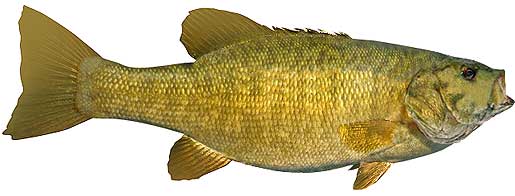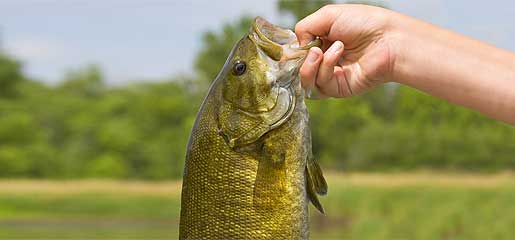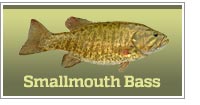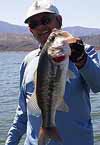Fishing For Smallmouth Bass
A beginners guide to catching smallmouth bass
By Rick Seaman
Nov 4, 2024
Tips For Smallmouth Bass Fishing
- Basic Smallmouth Bass Fishing Tackle
- Smallmouth Bass Fishing Video
- Bass Lures For Beginners
- Top 3 Tips For Beginners
- Bass Tackle For Intermediate Anglers
- Additional Lures For Intermediate Anglers
- Top Tips For Intermediate Anglers
- World Record Smallmouth Bass
- Advice For Serious Smallmouth Bass Fishing Enthusiasts

Beginners
Smallmouth bass fishing for beginners and novice anglers. Includes tips which can be used while fishing from a boat or while fishing from the bank.
Basic Bass Tackle For Beginners
Rod. Start with a 5' 6" to 5' 10", medium to medium heavy action rod, preferably with a fast-action tip.
Reel. Baitcasting reels work best for the vast majority of bass fishing conditions. Get the best quality you can afford, and practice until you can make accurate casts.
Line. Begin with 10# to 12# monofilament line. Pay a little extra and get decent quality line.
Bass fishing basics video
Basic Lures For Beginners
Spinnerbait. A spinnerbait can be used in all types of cover, water conditions and weather. Start with a 1/4 oz or 3/8 oz spinnerbait, with double willow blades and a white or chartreuse skirt.
Texas-rigged worm or Senko®. Use either with a sliding slip sinker, to fish in and around most any cover, shallow or deep.
3 Important Tips For Beginners
Tip 1. Smallmouth bass prefer to hang around rocky cover. Look for shoreline with big rocks, rocky points, or gravel bed areas nearby deep water. Search out any rocky areas that are ideal for crayfish.
Tip 2. Thoroughly fish the area with multiple, accurate casts - especially to shady areas. Then keep moving to find more cover. This is best accomplished from a boat, however can be done from shore for those who like to adventure out along the shore.
Tip 3. Use good knots and re-tie anytime the knot or line has been nicked or frayed. Always use sharp hooks, if they are dull replace or sharpen them

Intermediate Anglers
Bass Tackle For Intermediate Anglers
Rods. For longer casts, choose a 6' to 7', medium to medium heavy action rod, preferably with a fast-action tip. As a second rod choose a 6' or longer spinning rod in medium to medium heavy action rod, preferably with a fast-action tip. Shimano, Bass Pro Shops, G. Loomis, Fenwick, Lew's and Abu Garcia, among others, all make a variety of quality rods in varying price ranges.
Reels. Baitcasting reels work best for the vast majority of bass fishing conditions. Shimano Curado, Abu Garcia Revo, Lew's Mach Crush, Bass Pro Shops Johnny Morris Series and Daiwa Fuego are five good choices, and there are many others. Accurate casts are crucial to success.
Line. Line choices include monofilament, fluorocarbon, and braided line - sometime in combination. Braided line with a monofilament or fluorocarbon tip can be an ideal setup, depending on conditions. Use an alberto or albright knot to join lines. Monofilament or fluorocarbon in 8# to 10# line is a great starting point.
Basic Lures For Intermediate Anglers
In addition to spinnerbaits and Texas-style worms, learning to use the following baits can improve your chances for success.
Topwater Lures. Buzzbaits, poppers, propbaits, walking baits, wake baits and many others will catch smallmouth when they are feeding near the surface - over deep or shallow water.
Crankbaits. Based on depth and cover, choose from lipless crankbaits, medium-depth crankbaits and deep crankbaits. Often, smaller profile lures get more smallmouth bites. Making accurate casts, and varying speeds, can entice strikes.
Jigs. Lead-head jigs can be dressed with all sorts of creature-bait plastics to imitate crawfish or sunfish. They can be retrieved fast as a swim jig, or slow crawled on the bottom.
5 Important Tips For Intermediate Anglers
Fishing Reports. Read current fishing reports and bass tournament results from the lake you wish to fish, also review these reports and results from this time last year. Learn how to gain maximum knowledge from fishing reports.
Lake Maps. Contour maps identify creek channels, flats, ledges, drop-offs, and depth variations. This information can help you plan your time on the water, well before you head to the lake.
Focus On Finding The Fish. Smallmouth bass move up and down in the water column in search of the best available water temperatures, availability of food, and a variety of other factors. Begin the day fishing shallow, medium and deep water in search of the best depth for the day. Bass also migrate throughout the lake following baitfish, so fish out on points, back in coves, on ledges in open water, and along the edges of creek channels at a variety of depths. Once you locate fish, concentrate on that depth and similar locations.
Keep Lure Selection Simple. Smallmouth bass are not as picky as we tend to think. Stick to basic colors. For crankbaits and jerkbaits stick to shad or crawfish colors. For worms and jigs, stick to basic crawfish colors. Depending on water clarity contrast may be an issue dictating dark or flashy colors.
Use Multiple Baits. Once you locate an area holding bass, try a variety of lures to see which entices more bites. In shallow water, try topwater, crankbaits, spinnerbaits, vibrating jigs, and jerkbaits for reaction bites. Worms and jigs for slower presentations. In deep water try big worms, drop-shot rigs, and jigging spoons. For each bait vary the speed and action to determine the best approach for getting bites
Experienced Anglers
 Advice For Serious Smallmouth Bass Fishing Enthusiasts
Advice For Serious Smallmouth Bass Fishing Enthusiasts
Study the life cycle of bass, their annual migrations, daily movements, and food sources available in the lake you plan to fish. Our focus here is to assist beginner and intermediate anglers. For those wishing to take the next step there are a multitude of options for growing your knowledge of fishing for smallmouth bass.
Bass Clubs & Tournaments. You can join and participate, with or without a boat, and learn from some of the better anglers in your area.
Time On The Water. Experience is the best teacher. Spend time locating the fish and experimenting with a wide variety of lures and techniques.
Gather Information Online. Read information on your local Fish & Game Department website. Review websites offered by expert bass anglers, fishing organizations and local fishing guides. Some highly regarded websites covering smallmouth bass fishing include Bassmaster, Linder's Angling Edge, and Kevin VanDam.
Have Fun. Fishing for smallmouth bass can be very rewarding. Be diligent, but enjoy the process. Fishing is a life-long journey, and you can learn something new every day you spend on the lake!

world record: 10 pounds, 14 ounces
 Rick Seaman is a fishing enthusiast with over five decades of fishing experience, a retired tournament fisherman, author of numerous published articles on fishing, and co-author of the book "Bass Fishing - It's not WHAT you throw, It's WHERE you throw it".
Rick Seaman is a fishing enthusiast with over five decades of fishing experience, a retired tournament fisherman, author of numerous published articles on fishing, and co-author of the book "Bass Fishing - It's not WHAT you throw, It's WHERE you throw it".
Related Articles
Bass information by state
021826
Fishing Information


